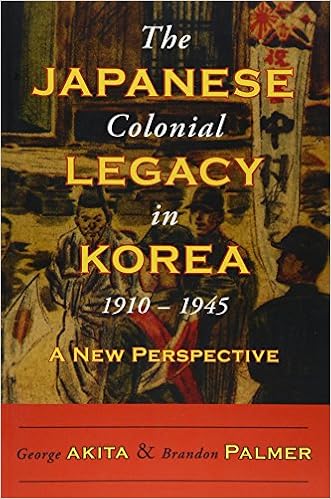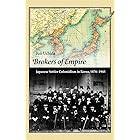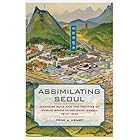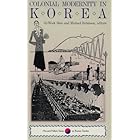The Japanese Colonial Legacy in Korea, 1910-1945: A New Perspective: George Akita, Brandon Palmer: 9781937385705: Amazon.com: Books

The Japanese Colonial Legacy in Korea, 1910–1945: A New Perspective Paperback– February 28, 2015
by George Akita (Author), Brandon Palmer (Author)
2.5 out of 5 stars 2 customer reviews
--------------

Brokers of Empire: Japanese Settler Colonialism in Korea, 1876–1945 (Harvard East Asian Monographs) Paperback
Jun Uchida
4.6 out of 5 stars 4
$29.95 Prime
Under the Black Umbrella: Voices from Colonial Korea, 1910-1945 Paperback
Hildi Kang
4.3 out of 5 stars 17
$19.95 Prime

Assimilating Seoul: Japanese Rule and the Politics of Public Space in Colonial Korea, 1910–1945 (Asia Pacific Modern) Paperback
Todd A. Henry
5.0 out of 5 stars 1
$31.45 Prime

Colonial Modernity in Korea Paperback
Daqing Yang
5.0 out of 5 stars 1
$20.95 Prime
-----------------
Editorial Reviews
About the Author
George Akita is professor emeritus in the Department of History, University of Hawai'i, USA.
Product details
Paperback: 232 pages
Publisher: MerwinAsia (February 28, 2015)
Language: English
-------------
Top customer reviews
Avery
3.0 out of 5 starsNeeds a serious editorJuly 13, 2015
Format: Paperback|Verified Purchase
A book like this is much needed, but this book is disjointed and unedited, and thus cannot be recommended to those who aren't dedicated to reconstructing the argument of the authors.
Much of the book reads like a personal letter from author Akita to a scholar on the fence about colonial Korea. Prof. Akita has been retired since 1984 and his academic writing is out of practice, although he has kept up-to-date with scholarly literature and newspapers. Akita wrote the basic narrative and chose what to focus on in what order, and he often injects personal asides, such as a positive experience he recently had with Japanese doctors. The role of the second author Palmer in the book's production is not entirely clear, and he is rarely referred to except as being fluent in Korean. Is he a background researcher who found a lot of statistics for Akita and was bumped up to co-author? I get the feeling that this is the case, but I cannot be sure. Tacking on a second author in this way is not common practice in academic or journalistic publications.
The book rambles between all sorts of different subjects, from the Japanese cultural background that influenced their administration in Korea, to Japanese economic and educational objectives in Korea, to modern-day China's ambitions in the Far East. I am often sympathetic with Akita's concerns but the book does not feel well-arranged and while there is good use of scholarly opinions and primary sources involved, there is also some reliance on tertiary sources and anecdotal evidence. The book also inserts rejoinders against other scholars here and there inside its rather short text, meaning that the narrative tilts back and forth between actually analyzing colonial Korea and talking about modern discourse on colonial Korea and how and why it may be biased. The tone of these rejoinders is a bit aggravating because Akita consistently proclaims that his own opinion will eventually be borne out by a coming revision in scholarship.
In short, while this book contains a decent amount of suggestions for revising the Korean nationalist narrative, and is bolstered by the support of many academics quoted within, it's far from a comprehensive and academic approach to the subject. I would put it at the level of a Japanese shinsho, except that shinsho typically exhibit stellar editing and contain all the materials needed to become a standard introductory text, and this book possesses neither of those virtues. Rather, I would equate it with a right-wing imitation of shinsho, typically published by a minor press in Japan. In point of fact, the Japanese translation of this book was published by the minor press Soshisha, which focuses on translations and center-right publications.
2.5 stars, rounded up in the end because the facts in this book deserve wider distribution. I just wish they could have taken a better format.
I recommend C. Sarah Soh's book The Comfort Women: Sexual Violence and Postcolonial Memory in Korea and Japan as a far superior, unbiased study of one aspect of the Korean colonial experience.
Read less
5 people found this helpful
-----------------------

usabear
2.0 out of 5 stars
Read less
5 people found this helpful
-----------------------
usabear
2.0 out of 5 stars
Suspect Revisionist HistoryAugust 11, 2015
Format: Hardcover
It’s interesting that people are still trying to write apologias for the Japanese Colonialist endeavors prior to WWII. In that respect Akita’s book is hardly “A New Perspective”. This book is a mishmash of contradictory statements and evidence in Akita’s attempt to convince us that the Japanese takeover of Korea was in the Koreans’ best interest.
The author calls upon other countries’ colonial enterprises saying that these demonstrate that the Japanese behavior in Korea was well within the bounds of accepted colonial practice (as if even that would justify it). He cites examples of legal activities in Japan concerning Japanese citizens as proof that the treatment of Koreans must have been the same. However, when it comes to evidence of the actual treatment of Koreans, he waffles and attempts to selectively pick out examples where the treatment was more moderate than was the general rule. He glosses over evidence that contradicts his position, often relegating these to footnotes. He spends more time on conditions in Japan and elsewhere than on the actual conditions in Korea under the Japanese occupation.
One of his attempts was to compare the British colonialists attempting to subjugate the people in the American colonies with the people being subjugated in Korea. The Japanese colonialists were much like the oppressed people in the American colonies, he would have us believe.
He asserts that the American installed first president (Syngman Rhee) of independent Korea was anti-Japanese, but fails to tell us that one of the first things Rhee did upon taking office was to round up and imprison or execute/assassinate anyone opposed to his dictatorial position, particularly left-leaning people who were in the forefront of opposition to Japanese rule. Rhee was ideologically bound to the same principles as the Japanese Government – and was eventually forced out of office. He also fails to report that the United States at the end of WWII unilaterally divided Korea into North and South, setting the stage for the Korean War. The effects of the Japanese subjugation of Korea have remained permanently imbedded on the Korean peninsula. It took nearly fifty years for South Korea to achieve any real representative government, and North Korea stands out as a byproduct of international meddling.
Akita goes to great lengths to certify the credentials of anyone whose writings he can use to support his agenda, even where these sources are, in balance, not in accord with his own positions. Those who have supported the Nationalist side are treated with disdain and given short shrift.
It’s not clear what the exact nature of Brandon Palmer’s participation in this book was. It is noteworthy, however, that Akita neither reads nor speaks Korean, so must rely on secondary sources for any Korean input.
Finally, Akita pronounces that South Korea could not have achieved its post-war growth without the prior existence of the Japanese Colonialist structures during the occupation of Korea. Of course, we have no way of disproving such a broad statement, since the Koreans were forced into a Fascist dictatorship following the war, and were not able to find their own path.
This is not to say that certain structures put in place by the Japanese to control the Koreans were not continued after Korea’s liberation, particularly under Syngman Rhee. It also must be conceded that there was a degree of modernization that took place under Japanese rule, and this certainly has had an impact on post-war Korean life.
In sum, there is no justification for the Japanese subjugation of Korea, regardless of the nature of that subjugation. I give the book two stars, rather than one, only because it is important to understand the lengths to which some people will go to paper over the effects of the pre-WWII Japanese Empire.
Read less
Format: Hardcover
It’s interesting that people are still trying to write apologias for the Japanese Colonialist endeavors prior to WWII. In that respect Akita’s book is hardly “A New Perspective”. This book is a mishmash of contradictory statements and evidence in Akita’s attempt to convince us that the Japanese takeover of Korea was in the Koreans’ best interest.
The author calls upon other countries’ colonial enterprises saying that these demonstrate that the Japanese behavior in Korea was well within the bounds of accepted colonial practice (as if even that would justify it). He cites examples of legal activities in Japan concerning Japanese citizens as proof that the treatment of Koreans must have been the same. However, when it comes to evidence of the actual treatment of Koreans, he waffles and attempts to selectively pick out examples where the treatment was more moderate than was the general rule. He glosses over evidence that contradicts his position, often relegating these to footnotes. He spends more time on conditions in Japan and elsewhere than on the actual conditions in Korea under the Japanese occupation.
One of his attempts was to compare the British colonialists attempting to subjugate the people in the American colonies with the people being subjugated in Korea. The Japanese colonialists were much like the oppressed people in the American colonies, he would have us believe.
He asserts that the American installed first president (Syngman Rhee) of independent Korea was anti-Japanese, but fails to tell us that one of the first things Rhee did upon taking office was to round up and imprison or execute/assassinate anyone opposed to his dictatorial position, particularly left-leaning people who were in the forefront of opposition to Japanese rule. Rhee was ideologically bound to the same principles as the Japanese Government – and was eventually forced out of office. He also fails to report that the United States at the end of WWII unilaterally divided Korea into North and South, setting the stage for the Korean War. The effects of the Japanese subjugation of Korea have remained permanently imbedded on the Korean peninsula. It took nearly fifty years for South Korea to achieve any real representative government, and North Korea stands out as a byproduct of international meddling.
Akita goes to great lengths to certify the credentials of anyone whose writings he can use to support his agenda, even where these sources are, in balance, not in accord with his own positions. Those who have supported the Nationalist side are treated with disdain and given short shrift.
It’s not clear what the exact nature of Brandon Palmer’s participation in this book was. It is noteworthy, however, that Akita neither reads nor speaks Korean, so must rely on secondary sources for any Korean input.
Finally, Akita pronounces that South Korea could not have achieved its post-war growth without the prior existence of the Japanese Colonialist structures during the occupation of Korea. Of course, we have no way of disproving such a broad statement, since the Koreans were forced into a Fascist dictatorship following the war, and were not able to find their own path.
This is not to say that certain structures put in place by the Japanese to control the Koreans were not continued after Korea’s liberation, particularly under Syngman Rhee. It also must be conceded that there was a degree of modernization that took place under Japanese rule, and this certainly has had an impact on post-war Korean life.
In sum, there is no justification for the Japanese subjugation of Korea, regardless of the nature of that subjugation. I give the book two stars, rather than one, only because it is important to understand the lengths to which some people will go to paper over the effects of the pre-WWII Japanese Empire.
Read less
No comments:
Post a Comment